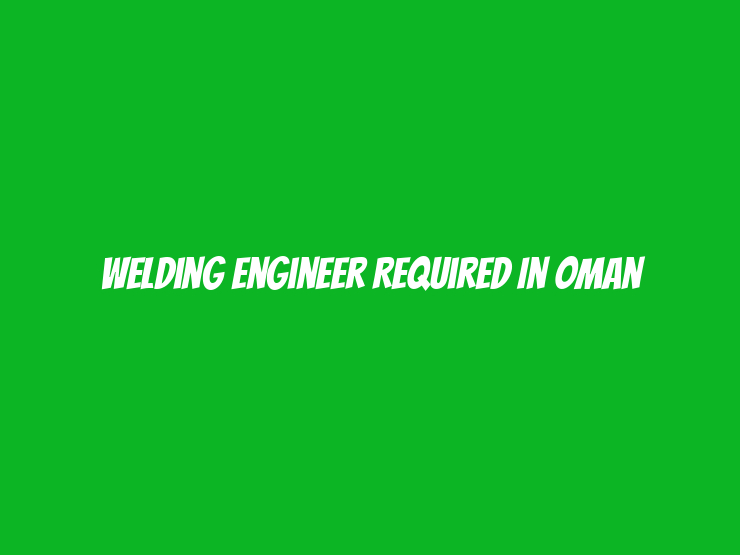A Welding Engineer is responsible for designing, implementing, and overseeing welding processes and procedures in various manufacturing and construction environments. This role is essential in ensuring that all welding activities meet industry standards, safety regulations, and project specifications. The Welding Engineer works closely with cross-functional teams, including design, quality assurance, and production, to develop efficient welding techniques and to troubleshoot any issues that may arise during the welding process. This position requires a strong technical background in metallurgy, materials science, and welding technologies.
| Salary | Market Competitive |
| Experience | 3 – 5 years |
| Location | Oman |
| Qualification | Bachelor of Technology/Engineering |
| Posted | 30 September 2024 |
| Job Type | Full-Time |
| Posted by | Habeebi Recruiter |
| last date to apply | apply within 15 days of posting |
Key Responsibilities
Design and Development of Welding Processes
One of the primary responsibilities of a Welding Engineer is to design and develop welding processes that meet project specifications and industry standards. This involves selecting appropriate welding techniques, materials, and equipment based on the specific requirements of each project. The engineer evaluates different welding methods, such as MIG, TIG, arc, and resistance welding, to determine the best approach for achieving desired results. By designing efficient welding processes, the engineer contributes to optimizing production schedules and minimizing costs.
Welding Procedure Specifications (WPS)
Welding Engineers are tasked with creating and maintaining Welding Procedure Specifications (WPS) that detail the essential variables, techniques, and safety precautions for each welding process. These documents serve as guidelines for welders and ensure that all welding activities are performed consistently and in compliance with industry standards. The engineer conducts tests to validate the WPS and makes necessary adjustments based on performance results and feedback from the welding team.
Quality Control and Assurance
A critical aspect of the Welding Engineer’s role is to establish quality control measures to ensure the integrity and reliability of welded structures. This includes developing inspection criteria, conducting non-destructive testing (NDT), and analyzing weld samples to identify defects or weaknesses. The engineer collaborates with quality assurance teams to implement corrective actions and continuous improvement processes, ensuring that all welding work meets or exceeds quality standards.
Project Management and Coordination
Welding Engineers often take on project management responsibilities, coordinating welding activities across different teams and departments. This includes scheduling work, managing resources, and ensuring that projects are completed on time and within budget. The engineer communicates with project managers and stakeholders to provide updates on progress and address any issues that may arise during the welding process. Effective project management skills are essential for maintaining workflow and meeting project deadlines.
Training and Development
Training and mentoring welders and other personnel is another key responsibility of a Welding Engineer. The engineer provides guidance on best practices, safety protocols, and welding techniques to enhance the skills of the workforce. This involves conducting training sessions, workshops, and demonstrations to ensure that all team members are knowledgeable about the latest welding technologies and industry standards. By fostering a culture of continuous learning, the Welding Engineer helps to improve overall productivity and safety in the workplace.
Research and Innovation
Welding Engineers are expected to stay abreast of technological advancements and innovations in welding processes and materials. This involves conducting research to explore new welding techniques, equipment, and materials that can enhance productivity and quality. The engineer collaborates with research and development teams to evaluate the feasibility of implementing new technologies and continuously seeks ways to improve existing processes.
Qualifications and Skills
To be successful as a Welding Engineer, candidates should possess the following qualifications and skills:
- A bachelor’s degree in Welding Engineering, Mechanical Engineering, Materials Science, or a related field.
- Proven experience in welding engineering, with a strong understanding of welding processes and techniques.
- Knowledge of welding codes and standards, such as AWS, ASME, or ISO.
- Proficiency in welding simulation software and other engineering tools.
- Strong analytical and problem-solving skills, with attention to detail.
- Excellent communication and interpersonal skills to work effectively with cross-functional teams.
- Project management skills to oversee multiple projects simultaneously.
- A commitment to safety and quality assurance in all welding activities.
The role of a Welding Engineer is ideal for individuals who are passionate about engineering, possess strong technical skills, and enjoy solving complex problems. This position offers the opportunity to work on diverse projects, contribute to innovative welding solutions, and play a crucial role in ensuring the quality and safety of welded structures.
How to apply:
Send your updated resume to our email or directly reach us at our phone:
Email: muthukumar@shiyali.in, thilagavathi@shiyali.in
Telephone: +9840373512/9840350512

